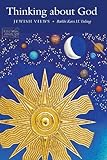Thinking about God : Jewish views / Kari H. Tuling.
Material type: TextSeries: JPS essential Judaism seriesPublisher: Lincoln : University of Nebraska Press, [2020]Description: 1 online resourceContent type:
TextSeries: JPS essential Judaism seriesPublisher: Lincoln : University of Nebraska Press, [2020]Description: 1 online resourceContent type: - 9780827618480
- 0827618484
- 9780827618466
- 0827618468
- 296.3/11 23
- BM610 .T85 2020eb
- online - EBSCO
| Item type | Current library | Call number | URL | Status | Notes | Barcode | |
|---|---|---|---|---|---|---|---|
 eBook
eBook
|
Biblioteca "Angelicum" Pont. Univ. S.Tommaso d'Aquino Nuvola online | online - EBSCO (Browse shelf(Opens below)) | Online access | Not for loan (Accesso limitato) | Accesso per gli utenti autorizzati / Access for authorized users | (ebsco)2503932 |
Cover -- Series Page -- Title Page -- Copyright Page -- Dedication -- Contents -- Acknowledgments -- Introduction -- Part 1. Is God the Creator and Source of All Being-Including Evil? -- 1. What Does It Mean to Say That God Created the World? -- 1.1. A Biblical View: In the Image of God -- 1.2. From the Liturgy: God Renews Creation Day by Day -- 1.3. A Rabbinic View: The Trouble with Angels -- 1.4. A Medieval View: Ibn Pakuda's Logical Analysis -- 1.5. A Modern View: Green's Divine Helpmate -- 1.6. A Modern View: Kushner's Sermon -- 1.7. Summary of Views
1.8. Meaning of the Seven-Day Creation Narrative -- 1.9. Intended Role of Humanity -- 2. How Does Evil Exist in a World with a Good God? -- 2.1. A Biblical View: Romping in the Garden of Eden -- 2.2. From the Liturgy: The Soul You Have Given Me Is Pure -- 2.3. A Rabbinic View: The Impulse to Good and the Impulse to Evil -- 2.4. A Medieval View: Maimonides on Adam's Sin -- 2.5. A Modern View: Cohen on God's Holiness -- 2.6. A Modern View: Kushner on Bad Things That Happen -- 2.7. Summary of Views -- 2.8. The Question of Free Will -- 2.9. Why Does God Allow Evil to Exist?
Part 2. Does God Have a Personality-or Is God an Impersonal Force? -- 3. Is God Like a Person? -- 3.1. A Biblical View: Moses Asks to Behold God's Presence -- 3.2. From the Liturgy: Forgiveness and God's Body -- 3.3. A Rabbinic View: Where Is God's Place? -- 3.4. A Medieval View: Maimonides and the Attributes of Action -- 3.5. A Modern View: Buber's Dialogic Approach -- 3.6. A Modern View: Green's Non-Dualism -- 3.7. Summary of Views -- 3.8. Thinking of God as a Person -- 3.9. Imagining a Personal God vs. Imagining God as an Impersonal Force -- 4. Does God Have a Gender?
4.1. A Biblical View: What Does Gender Have to Do with It? -- 4.2. From the Liturgy: Our Father, Our King -- 4.3. A Rabbinic View: God's Fire and the Patriarchy -- 4.4. A Medieval View: Scholem Explains the Rise of the Shekhinah -- 4.5. A Modern View: Plaskow's Feminist Critique -- 4.6. A Modern View: Adler and the "Pudding Stone" -- 4.7. A Modern View: Falk's Poetic Rewrite -- 4.8. Summary of Views -- 4.9. Implications of Masculine Images of God -- 4.10. Rethinking the Meaning of Traditional Texts with Male Imagery -- 5. What Does It Mean to Declare God Is One?
5.1. A Biblical View: Hear, O Israel -- 5.2. From the Liturgy: The Shema and Its Blessings -- 5.3. A Rabbinic View: A Deathbed Shema -- 5.4. A Medieval View: Maimonides' Meditation -- 5.5. A Modern View: Schneerson's Explicit Mysticism -- 5.6. A Modern View: Soloveitchik Is Ever the Rationalist -- 5.7. A Modern View: Schachter-Shalomi's Embodied Prayer -- 5.8. Summary of Views -- 5.9. The Meaning of Bearing Witness to God's Oneness -- 5.10. Praying as One (Community) -- Part 3. Does God Redeem-or Might God Not Redeem? -- 6. Does God Intervene in Our Lives?
6.1. A Biblical View: Hannah Prays for a Son
"Investigating how Jewish thinkers from the biblical to the postmodern era have approached questions about God-e.g, "Is God like a person?," "Is God good?," "Does God redeem?"--And highlighting interplays between texts over time, Tuling elucidates many contradictory and sophisticated ways to think about God in Jewish tradition"-- Provided by publisher
Online resource; title from digital title page (viewed on August 06, 2020).


